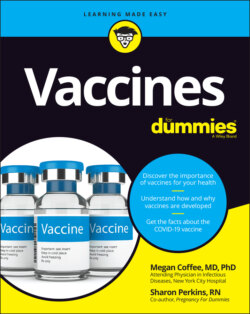Читать книгу Vaccines For Dummies - Sharon Perkins - Страница 31
Trying to Say Goodbye to Measles
ОглавлениеMeasles, once a common, extremely contagious, but sometimes deadly illness in children, is a viral disease we’re trying to say goodbye to. It’s a virus that causes a high fever, runny nose, cough, and pink eye. It may just seem like a bad cold at first, but then three to five days later, the rash it’s known for pops up.
We don’t have a drug that cures measles, but most people get better in one to two weeks. About one in five need to be hospitalized. Some people develop lung or brain infections. Between one and three in every 1,000 infected will die. Measles also weakens the immune system for a bit, so you may get sick from another infection even after getting better. In rare cases, years after getting better, a fatal brain disease develops out of the blue in those who have recovered from measles.
The problem is that measles spreads silently in the air, and it spreads far. It can drift and infect people far away in a sports stadium, who never even saw the person who was ill. It can also spread before the telltale rash appears. One person can cause 12, maybe 18, new infections if no one is vaccinated. It also doesn’t make people sick for another 10 to 12 days, so it can be hard to track where they got it.
Before there was a vaccine, 2 to 3 million people, mostly children, died each year from measles. With vaccination, we have been able to eliminate chains of transmission in many countries. Measles was declared eliminated in the United States in 2000, but cases pop up each year, often a souvenir from travel possibly followed by local spread. Worldwide, too many people still die from it, around 200,000 a year.
Because measles is so easily transmitted, you need almost everyone to be in this together to say goodbye to measles. The virus is really good at spreading to a lot of people, invisibly, all at once. Because it can spread so easily, at least 19 out of every 20 people need to be vaccinated to eliminate measles altogether. Where there has been a reluctance to vaccinate, the measles takes advantage and hides out, causing outbreaks to pop up, mostly among the unvaccinated.
Measles is different from German measles (also called rubella), which has now been eliminated from the Western Hemisphere and is on the decline elsewhere.
